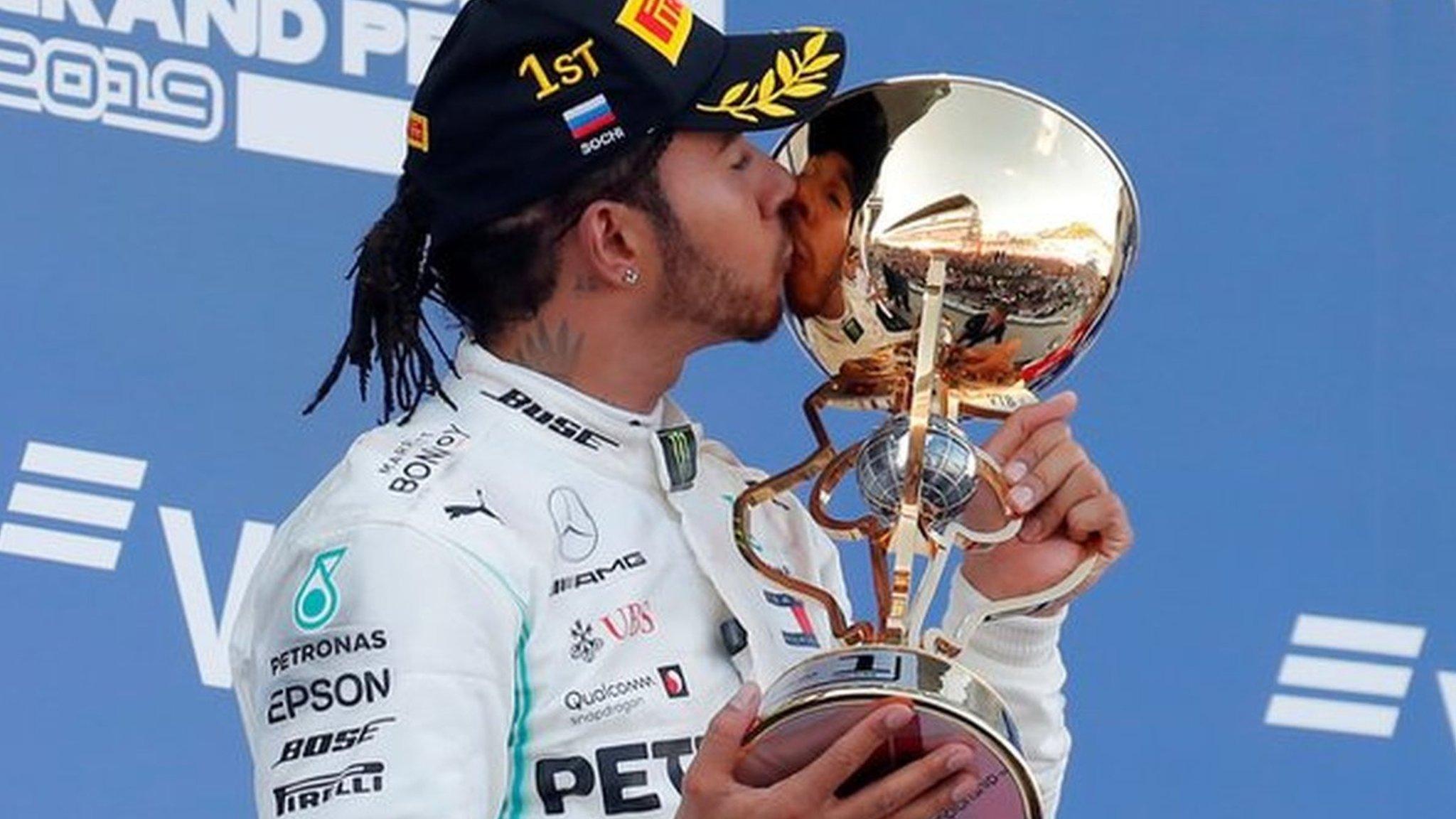Russian GP: Can Ferrari control Charles Leclerc and Sebastian Vettel fall-out?
- Published
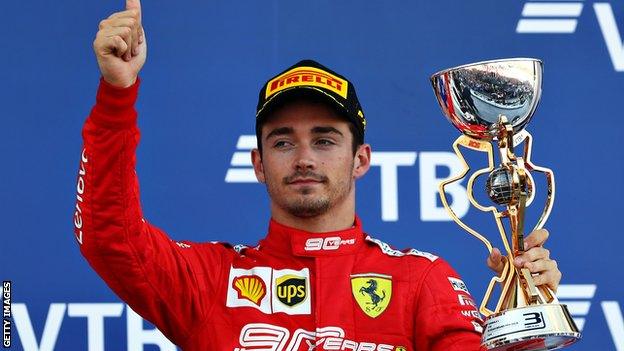
Ferrari's damage-limitation mode went into overdrive after the Russian Grand Prix, but it remains to be seen whether they will be able to control the fall-out from the latest team orders controversy between their two drivers.
The facts are simple.
Sebastian Vettel, several times in the early laps of the race, ignored a direct order to let Charles Leclerc past him into the lead.
Vettel was in front as a result of Leclerc executing his part of a strategy agreed before the race and aimed at ensuring the German could pass Lewis Hamilton's Mercedes, which qualified between them in second place, so the Ferraris could run one-two after the start.
It seems, though, that Vettel did not fulfil his part of the bargain, and - although they denied it afterwards - it looked as if the team had to take things into their own hands to resolve it.
There is so much at stake here - a proud champion fighting for his position in the team, which is patently under threat from an extravagantly talented youngster, and a team boss struggling to contain the potentially volcanic mix when two alphas are in the same cage.
In the end, the way the race turned out, Ferrari were able to keep a lid on the situation - publicly at least. But as the dust settled afterwards, from what was not said as much as what was, it was hard to believe that the matter would rest there.
What was the plan?
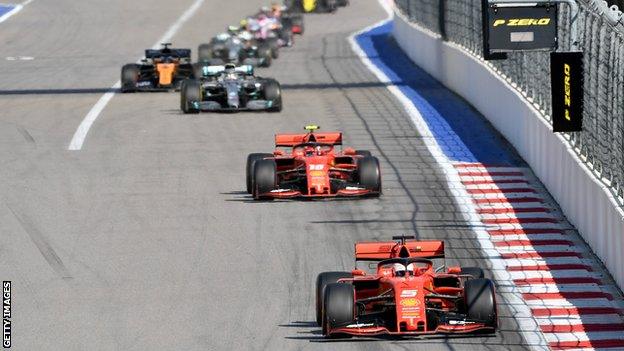
Sebastian Vettel's refusal to move over for Ferrari team-mate Charles Leclerc eventually played into the hands of Lewis Hamilton
With Leclerc starting on pole and Vettel third, Ferrari were concerned about the threat from Hamilton in second on what is the longest run from the start to the first corner in any race all year.
They hatched a pre-race deal to ensure both Ferraris emerged from that corner in front of Hamilton.
"The agreement was very simple," Leclerc said. "I had to give the slipstream to Seb at the beginning, let him past at the second corner for us to be first and second and then to swap back."
Vettel was not quite so forthcoming.
"I don't know exactly what happened," he said. "We had an agreement. I spoke with Charles before the race and I think it was quite clear but maybe I missed something. We will speak later."
What was the agreement, he was asked?
"I don't want to share," Vettel said. "I don't want to put the team in a bad position afterwards. I know it's not fair because I think people deserve to know. We were talking about a strategy to find a way past Lewis. I had a very good start and there were a couple of options. I prefer not to [say]."
What happened out on track?
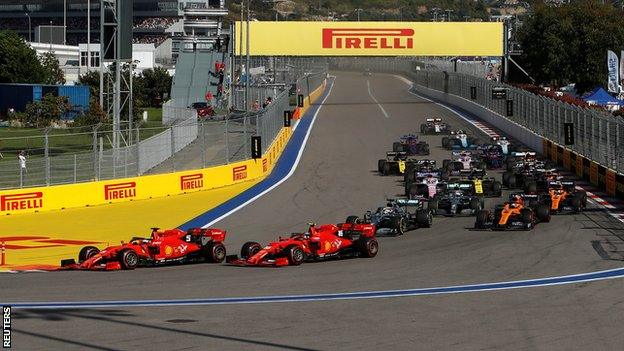
Vettel, who started third on the grid, was given a clear run at Turn Two after Ferrari team-mate Leclerc moved across to deny Hamilton the chance to use his slipstream
Up to Turn Two, the plan went as agreed. Leclerc towed Vettel, who passed Hamilton. Leclerc then held his position on the left-hand side of the track and Vettel took the lead down the inside.
The first anyone outside Ferrari knew of the pre-race plan was when a radio message to Leclerc from his engineer was broadcast.
"We are looking to do the swap later in the race," he said. Leclerc's reply was not transmitted.
On lap five, Leclerc was told: "He will let you by on the next lap."
Vettel then told the team: "I would have got him anyways. Let's break away for another two laps and let me know."
On lap seven, Vettel was told: "Let Charles by." He replied: "He will have to close up."
On lap eight, Leclerc seemed to be beginning to doubt Vettel's motives. He said: "You put me behind. I completely understand. The only thing is that I respected and I gave him the slipstream no problems. Then I tried to push at the beginning of the race. No problem. Manage the situation."
Vettel was told: "He's trying to close the gap. Let him by. He is 1.4 seconds behind."
A lap later, Vettel's engineer said: "We are looking to Plan C, Charles 1.9secs behind. You are the fastest car on track, head down, you are doing well."
Leclerc was then told: "Charles, we will do the swap a bit later on. Lewis is a bit close and we want to push now. Just focus on your race."
On lap 22, Leclerc was brought into the pits for fresh tyres. Vettel was left out for four further laps, on the second of which he said his tyres were going off. Vettel pitted on lap 26 and rejoined a couple of seconds behind Leclerc, only to retire after three-quarters of a lap with a failure in his hybrid system.
Vettel was told to park up immediately on safety grounds - Ferrari knew the car had lost electrical insulation but not what the potential consequences might be. That brought out the virtual safety car. Mercedes took the opportunity for a pit stop, knowing this would save them race time as the other cars were running to a pre-determined slower pace, and Hamilton rejoined still in the lead. Ferrari had lost the race.
What did Ferrari say?
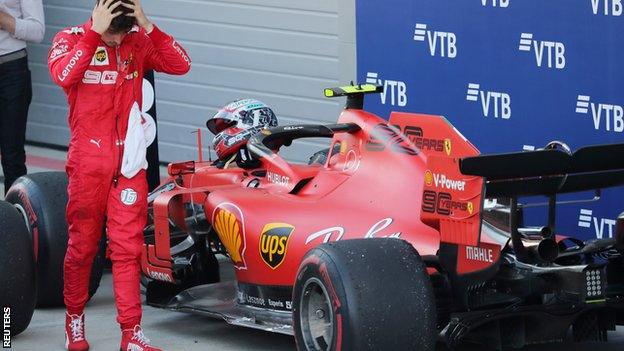
Leclerc cut a dejected figure in the parc ferme after the race
Ferrari team boss Mattia Binotto said: "As a team, the victory was key. So we decided the most important [thing] was to be first and second on the first lap because then we could manage the pace and the positions, which was what happened. Without any reliability issues, we would have kept the positions to the end of the race.
"How can you be first and second, protecting first but also gain a position? We agreed that the best way was not to give a slipstream to Hamilton, first, and therefore Charles would give the slipstream to Seb.
"But giving the slipstream and not defending would give the advantage to Seb, which later on [we] would give back by swapping the cars. So that was the deal."
So why did the swap not happen in the opening laps?
"Our judgement was the start went as planned and therefore we thought it was right to ask Seb to swap the positions," Binotto said.
"Eventually the two drivers may have different opinions driving the car. But we discuss with them.
"We initially asked Seb to give the position back but [it's] fair enough to say at that stage maybe Charles was not close enough and we would have lost some time, and later on Seb was quite fast and gained some advantage so we knew we could decide to do it later."
Binotto denied the off-set pit stops were aimed at giving the lead back to Leclerc. He said Leclerc had to pit because his tyres were worn, and they left Vettel out because of the risk of losing the lead to Hamilton if there was a safety car. Vettel was stopped, Binotto said, when his tyres were starting to lose their edge.
"As a matter of fact," Binotto said, "Charles was ahead and Seb was behind, but the race was not over and there would have been plenty of time to decide what could have been the best opportunity later on."
Binotto's explanation gave Vettel a get-out, appeased Leclerc, but at the same time left the door open to the possibility that the German would have had a chance to challenge for the lead in the second part of the race had he not retired.
It was a masterclass in defusing a difficult situation. But will it work?
The background
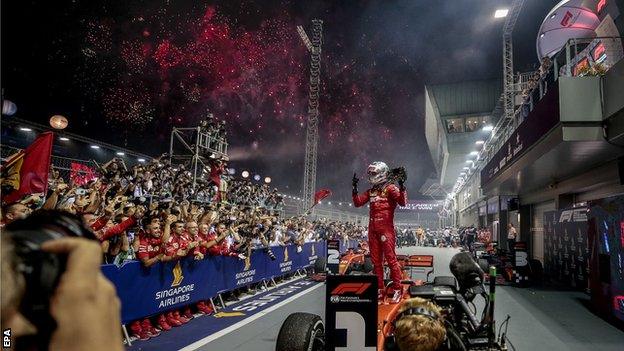
Vettel reaped the benefit in Singapore after Ferrari decided not to force him to let Leclerc past
What happened in Russia cannot be judged in isolation. It has to be seen in the context of the season as a whole.
Ferrari started the year saying that Vettel was their lead driver and that he would be favoured in the event of any 50-50 calls, the idea being that if any driver was likely to be the stronger over the year and be able to take the fight to Hamilton, it was likely to be the four-time champion, not the guy in only his second season.
But there have been problems from the start.
In the very first race, in Australia, Leclerc had to be told to hold station behind Vettel as he caught him in the closing stages of the race, after making a later pit stop.
Next time out in Bahrain, Leclerc took pole but dropped to third after a bad start. He was quickly on Vettel's tail for the lead but was told to hold station for two laps. He passed Vettel at the start of the next lap and would have taken a dominant victory had his engine not gone sour in the closing stages.
In China, Leclerc was leading Vettel, who asked to be let by claiming he was quicker, only not to be able to pull away when Leclerc did move over. "Now what?" Leclerc said.
Leclerc remained a thorn in Vettel's side throughout the first part of the season, but undermined his cause with some errors in qualifying.
Since the French Grand Prix in June, though, Leclerc has turned a corner, and has now out-qualified Vettel nine times in a row, at an average advantage of more than 0.4secs a lap.
In Hungary, the last race before the summer break, there was an exact reverse of the situation in Australia, with Vettel closing on Leclerc on fresher tyres in the closing laps after a later stop. They were left to race, and Vettel overtook.
When the season resumed in Belgium at the end of August, Vettel, struggling for pace, let Leclerc by and helped him out by holding back Hamilton for three or four laps, making his team-mate's path to a maiden victory that bit easier.
In Italy a week later, Vettel towed Leclerc on their first runs in final qualifying but the favour was not returned, as had been agreed.
Leclerc said that was not intentional, but a result of the difficult situation created by a lot of cars all driving slowly trying not to tow each other. Vettel was furious, and had his worst race of the year the following day, spinning on his own and colliding with another car when he tried to rejoin.
In Singapore, a week before Russia, Leclerc was leading from Hamilton and Vettel. Ferrari inadvertently managed to under-cut Vettel ahead of Leclerc as well as Hamilton. Now, Leclerc was angry. The team considered reversing the positions but decided against it.
What next?
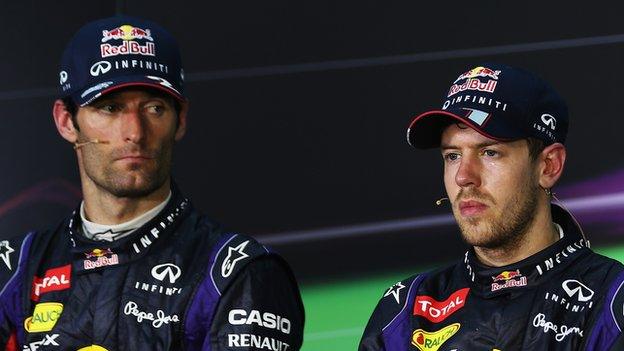
In 2013 Vettel refused to stay behind his team-mate Mark Webber at the Malaysian GP - despite repeated requests from Red Bull
After Russia, on social media, some defended Vettel, saying he was the faster driver on the day and deserved to keep the lead. He was named driver of the day by fans in F1's official vote.
But the fact remains that he directly disobeyed team orders on a number of occasions. And many interpreted his radio messages as a way to try to muddy the waters on the pre-race agreement, argue he was the quicker driver and should be allowed to maintain his position.
He has previous on this - many will remember the infamous "Multi-21" scandal of Malaysia 2013, when Vettel was ordered to hold station behind Red Bull team-mate Mark Webber in the final part of the race, but ignored the command and passed the Australian to take the win.
On Sunday evening, Leclerc was asked whether he still trusted Vettel. "Yeah, yeah," he said. "Of course - and it needs to be because for the good of the team it's very important."
He added: "I told them on the radio that I was 100% sure they would respect what we agreed. I thought that would happen and it did."
Would they discuss it?
"I don't think there is any discussion to have. At the end, everything that was told was respected. So I'm happy."
He had to say that, of course. But the question is whether he really believes it.
If, at a subsequent race, there is a similar agreement, will Leclerc be quite as keen to let his team-mate by, having seen how he reacted in Sochi?
For Vettel, meanwhile, the stakes are much higher, for it could be argued he was playing a dangerous game in fighting Ferrari's orders on Sunday.
He can make the case that he was quicker on the day - as he appeared to be, even if it's impossible to know how their relative pace would have been had Leclerc been in front and Vettel the one trying to stay with him in dirty air.
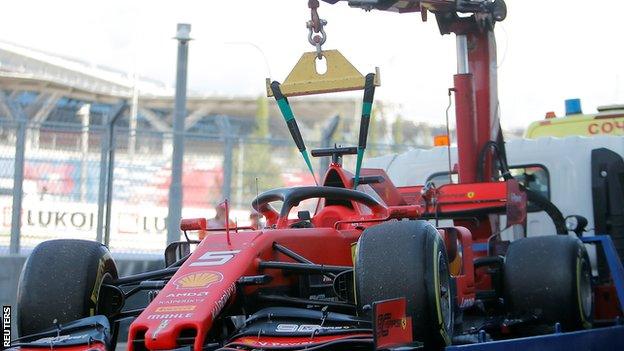
Vettel's retirement from the Russian GP ensured the Ferrari drivers did not have to battle it out at the end of the race
But Vettel is 32, and Leclerc is 21. Leclerc has two wins to Vettel's one this season. It could be 5-2.
Vettel can argue he should have won in Canada, where he was penalised for rejoining the track dangerously. Leclerc could counter that he would have won Bahrain, only lost Singapore by accident, and would have won in Russia had Vettel not retired when he did.
Leclerc has six poles this year to Vettel's one. And Vettel has this season continued to make major race-defining errors at a rate of one in every three grands prix. Leclerc looks like Ferrari's future. Vettel looks like a man fighting to hang on to one.
Ferrari have traditionally operated with a clear number one and number two, which right now they are not. And they have been very keen on using team orders to control races whenever they see the need. Which right now they still are.
After the race, Binotto was asked how he coped with what could be described as the hardest job in F1 management.
"I still believe it's a luxury," he said. "We have two fantastic drivers and that is where it is starting from."
How long will it be before he decides it is a luxury they might not be able to afford?
- Published29 September 2019
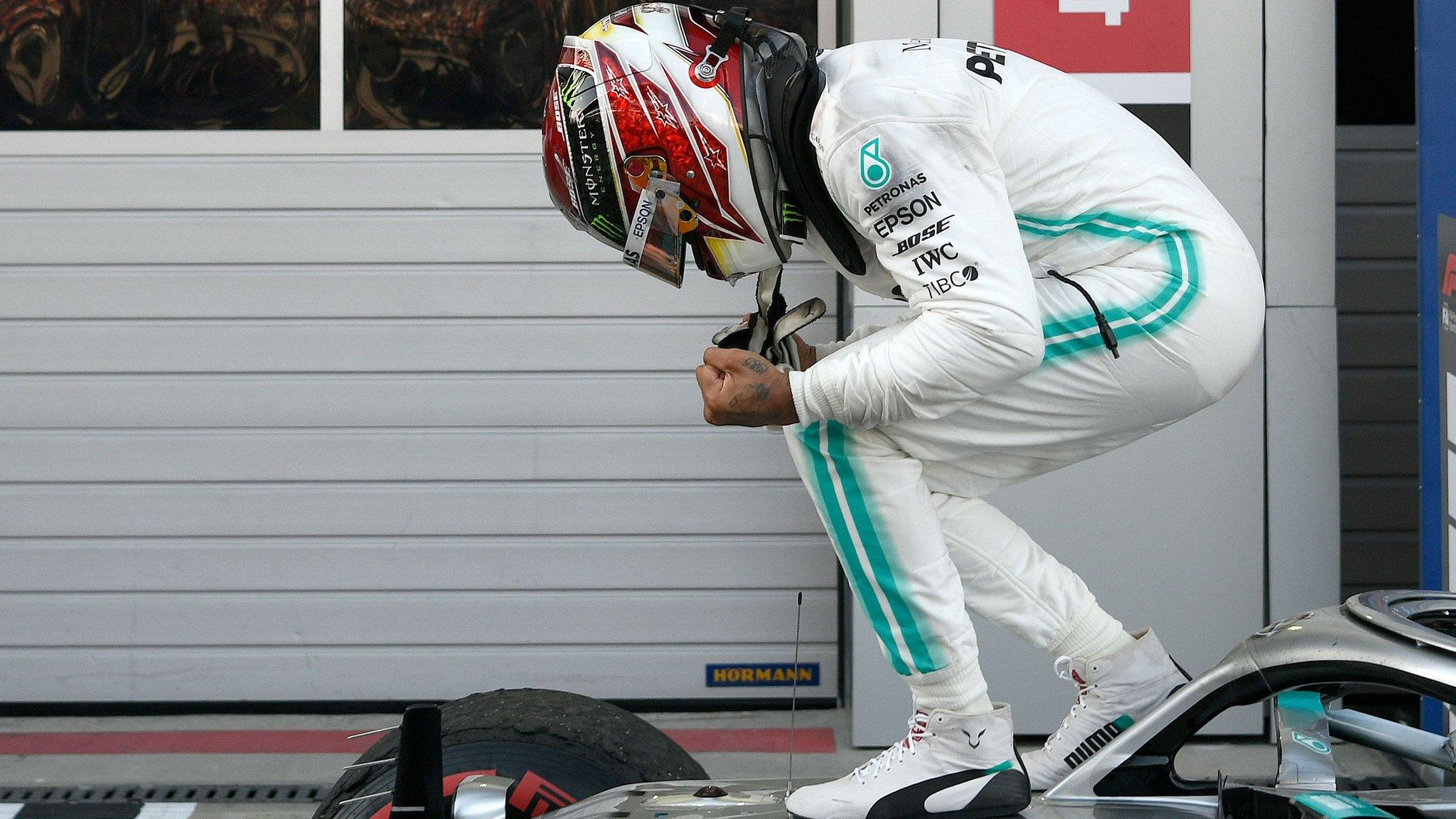
- Published28 September 2019
